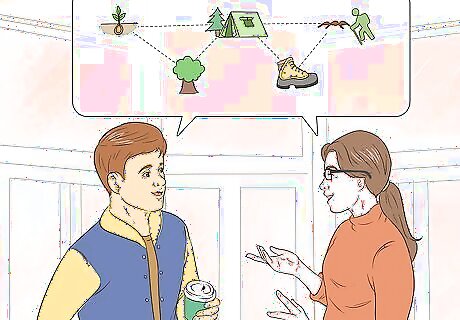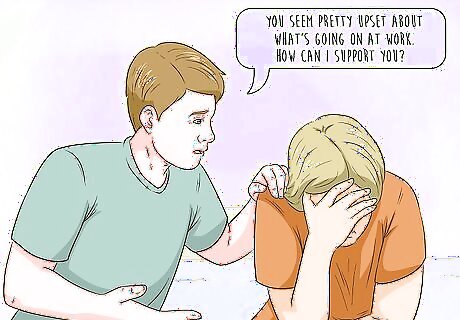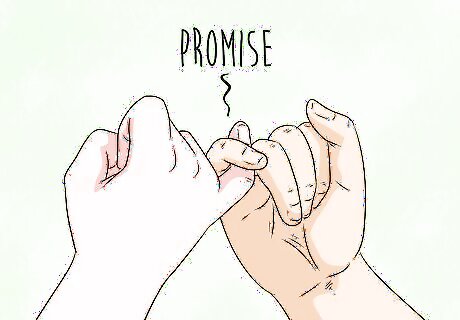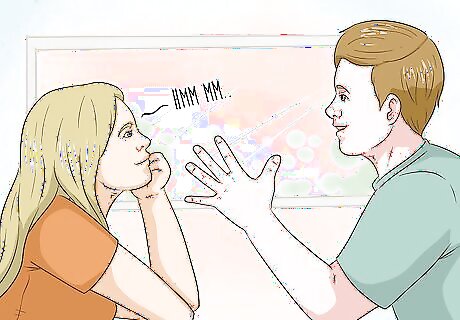
views
Getting to Know Each Other

Ignore gender stereotypes. Don’t feel like you need to act in a certain way to befriend someone of the opposite sex. You don’t have to play into gender stereotypes just to make a new friend. For example, if you’re a girl, don’t feel like you have to be into football for a guy to be friends with you. Likewise, guys don’t need to pretend to be into things that they think girls typically like, such as fashion or shopping. If you do like those things, great! Just don’t feel like you have to exhibit any interests that you don’t actually have. If you pretend to be someone you’re not, you’re not going to enjoy the friendship very much.

Be open to talking about a variety of topics. When you’re getting to know someone, it’s important to look for things that you have in common. That will help you establish a good friendship. In order to do that, talk about a lot of different things. You might be surprised to know what you learn! This doesn’t have to be complicated. For example, you might mention that you just tried a great new Thai place. That could lead to a conversation about the other person’s planned trip to Thailand or recommendations for another restaurant. Be willing to let the conversation flow naturally. Ask questions to show you are interested in their likes. You could say, “That's a cool Colts jersey. I don't know a ton about Indianapolis. Are you from there?"

Let the other person know if you are in a relationship. Be upfront with your friend about your romantic status. You wouldn’t hide your relationship from your other friends, right? You don’t have to make a big deal out of it. But it is important to let the other person know that you already have a romantic relationship so that they don’t get confused about your friendship goals. When you’re getting to know each other, it’s normal to ask if the other person is in a relationship. You can share your status, too. You can also casually drop the information into the conversation. Say something like, “My boyfriend and I just finished that new documentary on Netflix. Have you seen it?”

Clearly state your intentions about the friendship. It’s totally fine to be honest about what you are looking for in a new friendship. You can say, “I’ve noticed that you talk about movies a lot. I’m always looking for someone to see a matinee with. Do you want to be movie buddies?” If you’re looking for a deeper friendship, hopefully, that will develop with time. If you’re not sure what you want, that’s okay, too. You can start by hanging out and see what kind of friendship naturally develops.

Reevaluate being friends if you’re not on the same page. It’s possible that the other person is physically attracted to you. If they seem to hesitate when you make it clear that you just want to be friends, you might want to take a step back. It’s hard to be true friends when you don’t both have the same idea of what the relationship should look like. You can kindly say, “It’s really important to me to be comfortable in my friendships. It doesn’t seem like we’re on the same page, so we’re probably better off just staying friendly acquaintances.”
Making Sure the Friendship Feels Comfortable

Hang out in groups if that feels more comfortable. If you’re not used to being friends with someone of the opposite sex, it might take a while for you to get used to it. As your friendship is developing, you can suggest doing things with other people as you grow more comfortable. If you want, you can explain your feelings by saying, “I really prefer to hang out in groups when I’m getting to know new people. Is that cool with you?” You can also do this without drawing attention to your feelings. Whenever you invite your new friend to do something, just make sure that other people will be there, too.

Keep physical affection to a minimum to avoid blurring lines. Even if you’ve made your intentions clear, it might seem like you’re sending mixed signals if you use a lot of physical touches. Avoid holding hands or lingering when you give hugs. It’s definitely okay for there to be some physical contact. It’s appropriate to offer someone a hug if you are congratulating them or consoling them, for example. When you go out together, be sure to split the tab evenly. Always decline any romantic gestures that they offer.

Stay away from giving relationship advice. It’s possible that if you spend too much time talking about romance, the other person might misinterpret your motives. Other times, they might feel like you are overstepping your bounds by giving unwanted advice. While the friendship is developing, it’s best to just steer clear of discussing romantic relationships. Once you have a more established friendship, you can both decide if this is a boundary that can change. Your friendship can grow and develop in any way that works for both of you.

Respect each other’s romantic relationships. Sometimes your partner (or your friend’s partner) might be hesitant about your platonic friendship. If they ask you and your friend to put some boundaries in place, try to be accepting of that if they're reasonable. For example, if they ask that you 2 don’t go on weekend trips alone together, that is an understandable boundary. If your partner (or your friend’s partner) makes seemingly unreasonable demands, you can object. For example, if they try to stipulate that you can’t hang out anymore, try to find a compromise that makes everyone happy. Take some time to do a little self-reflection. Ask yourself if there is any legitimate reason that someone would think that you and your friend might be or might become more than friends. If you are in a relationship and your partner tries to unreasonably restrict your friendships, it might be time to reevaluate your relationship. No one has the right to control you.

Check-in about the friendship every several months. Feelings can change over time, so it’s important to make sure that you and your friend remain on the same page. Plan to have a sort of “state of the friendship” talk every so often. You can say to your friend, “Do you have a little time to talk? I just wanted to make sure we are both still comfortable in our friendship.” This might feel a little awkward at first, but it will help you make sure that the friendship doesn’t now contain a one-sided attraction.
Building a Strong Friendship

Make it a point to be kind. This might seem obvious, but it’s easy to sometimes take friends for granted. Instead, show kindness by building your friend up when they are going through a stressful situation. You can say, “You seem pretty upset about what’s going on at work. How can I support you?” You can also express gratitude. Let your friend know that you are thankful for them. Try saying, “I really appreciate that you always make time to hang out with me. It means a lot.”

Show that you are honest and trustworthy. Once you feel comfortable with your friend, try to be really open about yourself. Share concerns that you have, goals for your life, and personal feelings. You might also want to share past experiences to allow them to better understand you. This type of honesty can help build strong friendships. If your friend shares similar things with you, keep their confidence. Don’t share your conversations with others, and don’t ever gossip about your friend. This will show them they can depend on you.

Be a good listener. It’s probably important to you that your friend listens to you. Show them the same courtesy. When they are speaking, give them your full attention. Make eye contact and use facial expressions to show that you are paying attention. Ask follow-up questions to demonstrate that you care. You can say, “I heard you say that you’re really frustrated with your roommate. Can you tell me a little bit more about why you’re so upset?”

Commit to spending time with your friend. All friendships need maintenance. It’s normal to go through periods where you’re busier than usual, but try not to sacrifice your friendship during these times. Try to get together regularly, even if it’s just to catch up quickly over a cup of coffee. If you can’t meet up, try Facetiming. That’s a great way to “hang out” when your schedule is making actual face-to-face time impossible. If you really are pressed for time, just explain that to your friend. You can say, “I realize I haven’t had much time to spend with you lately. I’m really sorry. I promise that as soon as I finish this big project, we can go on that hike you’ve been talking about.”













Comments
0 comment